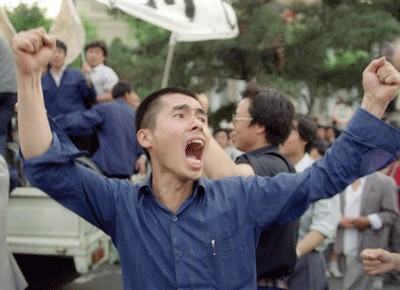




If tens of thousands of Chinese protesters flocked to Tiananmen Square today to demand pro-democracy reforms, would the military send in tanks and crush the revolt like they did in June 1989?
The question is not likely to arise at all as the wary Chinese authorities have been swift at nipping in the bud any political protests that could balloon to a million strong as seen in the heart of Beijing then, experts say.
Even so, the leadership of the ruling Chinese Communist Party will not hesitate to unleash its full military might if demonstrations do go out of control, rights groups said on the 22nd anniversary of the June 4 Tiananmen Square crackdown on student-led protests.
Two decades after the massacre, Beijing has refused to account for the killings of the hundreds gunned down by the military or to bring the perpetrators to justice.
Its treatment of dissent also has little changed.
"It's not simply Tiananmen. We have seen a consistent pattern of the (Chinese) government acting forcefully to prevent the emergence of any organized political movement," Stapleton Roy, a former U.S. ambassador to China, said in an interview.
He said "special circumstances"—such as divisions within the party leadership and the allowing of students to demonstrate for several months—permitted the Tiananmen protests to gain momentum at that time.
"I don't think there is any possibility that the authorities today would permit something like that to repeat itself," said Roy, who became envoy in Beijing two years after the bloody event that shocked the world and was condemned by most governments.
Memories

Beijing tolerates certain forms of protest, such as an April truckers' strike at port facilities in Shanghai, but represses others, like the actions of Ai Weiwei, an arrested celebrity artist and political activist, who has been a thorn on the side of the communist leadership, he said.
"As a rule, a frontal challenge to the authority of the Chinese Communist Party, as Ai’s activities embodied, practically guarantees a harsh response from the government," Pei said in a recent report in The Diplomat, a current-affairs magazine for the Asia-Pacific region.
"But protest inspired by specific economic grievances, such as truckers’ ire over excessive fees (levied on them), seems to fare better," he said.
"In the eyes of the ruling party, the former constitutes an existential threat and so no concessions are seen as able to appease political activists rejecting the very legitimacy of the regime," Pei said.
Differences in protests
Ex-US envoy Roy agrees.
"We have to differentiate between spontaneous protests over injustice, over taxation, over levying of tolls that people believe are illegal, things of this sort, and efforts to form political linkages like those that could challenge the rule of the communist party," he said.
Still, Roy does not sense a mood in China for a repetition of a Tiananmen-like confrontation.
"In watching the sentiment, both in China and among the reformers who left China following the Tiananmen incident, the consensus as I have been able to read it was that it was a mistake to push the demonstrations as far as as they did and that it set back the cause of reform."